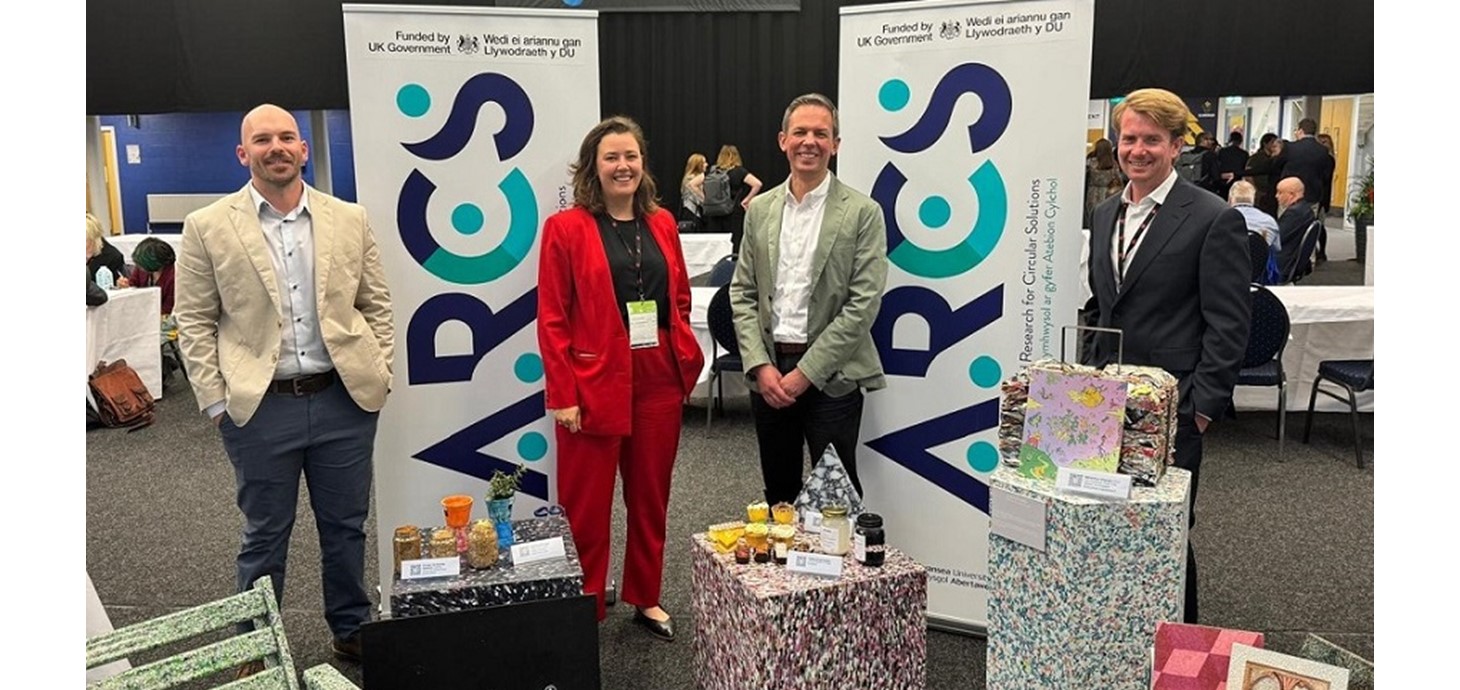
The ARCS team who support companies with circular economy business ideas: (l-r) Myhrden Major, Hannah Morris, Prof Gavin Bunting, Max Green
A Swansea University team that supports south Wales companies with launching green business ideas – turning waste plastic from beaches into new products for example – have revealed that they have helped 22 different companies, supporting the launch of 7 new and improved products and services.
Applied Research for Circular Solutions (ARCS) have been working with businesses across Swansea, Neath Port Talbot, Carmarthenshire and Pembrokeshire.
To celebrate the progress in 2024, ARCS will be hosting a Showcase event at the National Waterfront Museum, on the 12th February. It will be opportunity to hear more about the projects and companies supported through ARCS, and to see how environmentally driven decisions can also make financial sense.
Run by Swansea University's Faculty of Science and Engineering, ARCS is funded until March 2025 by the UK Government through the UK Shared Prosperity Fund. The support the ARCS team provide is tailored to the size, sector and ambitions of each company, as well as their level of familiarity with the circular economy. This is essential as success in implementing new business ideas is far less likely if it requires more time, resource or knowledge than the company has at its disposal. ARCS is now seeking new funding.
Amongst the new ideas the team helped to launch are: new packaging for edible plants designed to be returned and reused; turning food waste into pollution-busting bacteria; and improving recycling after music festivals.
These are all examples of what is known as the circular economy, where waste is designed out, and people and nature are designed in, so materials and products can be continually reused and recycled.
Despite some progress, there is a still a long way to go to move away from the traditional model, where materials are seen as having a finite life span before being discarded - a “take, make and dispose” approach which is unsustainable and generates mountains of waste.
Each year we consume over 100 billion tonnes of resources globally. Even today, over 90% of this is virgin materials, rather than recycled. Just one-third of it remains in use after a year and only 7% of everything we consume gets recycled after use.
Moving towards a circular economy has never been more important, as we aim for a greener and more sustainable future in the face of the climate crisis.
The benefits of the circular economy go beyond just cutting waste. It can also help slash carbon emissions.
Almost half of global carbon emissions are linked to the production of cars, clothes, food and other products we use every day. If we can increase the rate of circularity in how we manufacture our products to just 17% - from 7.2% at present- research has shown that it can cut total global emissions by 39%.
More widely still, a circular economy can help companies to boost their resilience, whilst supporting nature, creating jobs and regenerating local communities
Circular business ideas the ARCS team have supported include:
- On-site compacting of recycling after festivals, cutting transport emissions - two wheelie bins full of cans can be reduced to a block the size of a beer crate
- New reusable and fully recyclable produce trays for a company growing microgreens and microherbs using soil-free methods that require up to 95% less water than traditional methods
- Pollution-busting bacteria that can replace chemicals used in water and sewage treatment, with the ARCS team helping secure an Innovate UK Grant of nearly £50,000
- Eliminating single-use packaging for silicon-release liners, the film that protects the sticky side of most adhesive products
- Planning a business portfolio to improve the financial sustainability of a start-up creating new products out of plastic waste from beaches
Examples of the support ARCS have given companies include: market analysis, bid writing assistance, feasibility studies, product lifecycle assessment, and advice on circular economy criteria for procurement and supply chains.
Professor Gavin Bunting, leading the Applied Research for Circular Solutions group at Swansea University, said:
“Applied Research is all about bringing theory to life to create real-world solutions. When companies come to ARCS with a problem, we combine our cross-sector expertise with creative ideas to find innovative solutions and support resilient, circular businesses that are more economically and environmentally sustainable.
We have already made a difference, helping deliver new business ideas. But there is a lot more we can do to support more companies in embracing circular principles, cutting waste and helping us meet Net Zero targets. This has never been more urgent, and we are exploring new funding that will allow us to continue our work.”
